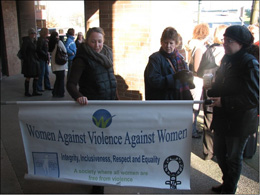BIO

WAVAW (Women Against Violence Against Women) is a non-profit organization that has been providing sexual assault support services to women 14 years of age and older, in Greater Vancouver for 23 years. We are open and accessible to all women survivors of violence. We operate within a feminist and anti-oppression framework, and are committed to non-violence.
PROJECT DESCRIPTION
Download project description as .PDF (67K)
Significance of the Day
December 6 is the National Day of Remembrance and Action on Violence Against women, each year across Canada events are held to remember victims of violence and to raise awareness of the serious violence faced by women in Canada and throughout the world. December 6th is a day of remembrance, reflection, healing, action and advocacy. Each year WAVAW (Women Against Violence Against Women) hosts a special event in recognition of this day.
Why a Smudge?
In commemoration of the National Day of Remembrance and Action on Violence Against Women 2007, WAVAW, along with the Squamish, Musqueum and Tsleil Waututh Nations, Aboriginal groups, multicultural organizations, and other women’s anti-violence groups, has organized a Sacred Smudge Ceremony of Vancouver’s Downtown Eastside (DTES).
A Smudge is a traditional healing practice of Aboriginal peoples, meant to restore health and give new and better life to the ailing. The long term daily violence against women in the DTES requires healing.
The conclusion of the trial concerning the Missing and Murdered women (Pickton Trial) reminds us of the reality of what women experience in the DTES as well as in all of Canada. 51% of women in Canada have experienced at least 1 violent incident as defined by the criminal code, women experience more severe forms of violence, are 3 times more likely than men to be injured by spousal violence and 5 times more likely to require medical attention, in fact each year, sexual and physical violence costs Canada 4.2 billion dollars. (Canadian Women’s Foundation, “The Hard Facts: Violence Against Women in Canada”) Moreover, roughly 50% of the Aboriginal population of the DTES is female and 70% of the women working as survival sex-trade workers in the DTES are aboriginal women, and their daily lives are shaped by experiences and fear of violence.
(Marginalized Voices for the Downtown Eastside: Aboriginal Women Speak about their Health Experiences. C. Benoit and D. Carrol, 2001, York University)
I walk in fear. I always walk in fear.
[Affidavit 062 at para. 16] (Pivot Legal Society report:Voices for Dignity pg. 16)
It is difficult to go out during the day. It is sometimes scary to leave during the day because I feel like there is someone watching me. I feel this is not any way to live.
[Affidavit 033 at para. 07] (Pivot Legal Society Report: Voices for Dignity pg. 16)
“It seems that no matter where in Canada I go, I hear of people who have lost someone on the DTES or know a girl who has been missing. All of our territories have been affected. This is an opportunity for our people to come together in unity to do our work in a Traditional way,” says Singing Thunderbird Child Twice Standing Woman Darla Laughlin, Aboriginal Outreach Counselor for WAVAW.
“Our Ceremonies have always been a way for us to make our lives better, to ask for new life. We know that our Traditional ways held our women as Sacred life givers and Clan mothers; we were leaders of our communities. It is time that we took back our inherent right, and time the rest of the world acknowledge our ways,” explains Laughlin.
Smudging the entire DTES will help to rid the area of the negative energy that has accumulated from years of experiences of violence.








































